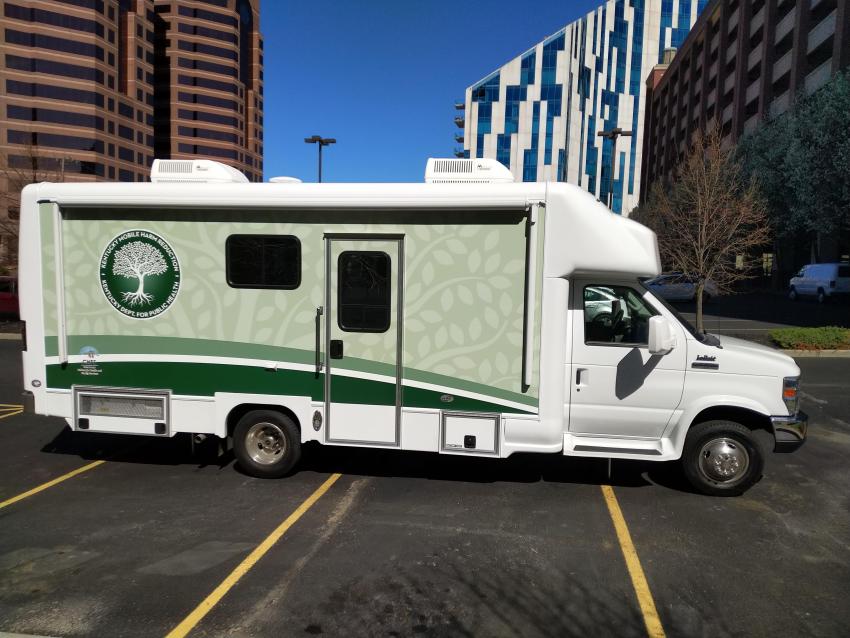
Mobile Harm Reduction Unit providing prevention, recognition and response trainings
Michelle Dean works daily with drug overdose fatality data with her role at the Kentucky Drug Overdose Fatality Surveillance System (DOFSS). She understands the importance of naloxone kits and educational training on what to do when a drug overdose occurs.
Remembering a training she participated in with Jody Jaggers at a Kentucky Injury Prevention and Research Center (KIPRC) meeting, Dean recently reached out to him and the team at the Mobile Harm Reduction Unit about the possibility of providing a training to her church’s weekly faith-based recovery meetings and to a local recovery center in Washington County.
“I wanted to provide education to the church staff and other people attending meetings so they know what to look for, how to administer the naloxone and what to do while waiting for EMS to arrive,” said Dean, who is the Data Coordinator Senior for DOFSS. “We also have people that are coming to the meetings for support that have family members struggling with addiction that may or may not attend the recovery meetings. I wanted to give them a tool to help their family member if the need should arise.”
Jaggers, who runs the Mobile Harm Reduction Unit, said its mission is to travel to events to make it easier for people to access naloxone and provide kits and educational handouts.
While the mobile unit was limited to only eight events in 2020 due to Covid, Jaggers said they were able to get back to scheduling in-person events in 2021 and completed 28 total events, including four virtually.
“Our primary and base service is to provide overdose prevention, recognition, and response training with a focus on how to use naloxone,” he said. “We provide nasal naloxone to any participant in our training that wishes to receive it. Our mobile unit has space to offer private HIV/HCV testing, but currently our team does not provide those services. However, at most of our events, there is another community partner present that does provide those testing services.”
The mobile unit staff handed out 868 two-dose units of naloxone last year.
Jaggers, the Director of Pharmacy Public Health Programs for the Kentucky Pharmacy Education & Research Foundation, said the mobile unit has multiple events scheduled for this year and many more in the works.
“We set a general goal this year of trying to have events in counties we have not traveled to east of I-65. That would be a minimum of 24 events this year, but we anticipate having more than that and won’t exclude a county just because we have been there in the past,” he said.
Dean said that if other organizations are thinking about having someone provide naloxone education to do it. She estimates that about 50 people participated in the two trainings she helped arrange. One interesting point she learned at the trainings was that drug overdose can happen to anyone.
“Drug overdoses aren’t limited to people with substance use disorder,” she said. “As Jody taught us, the elderly may forget they took their pain pills and take them again, causing an overdose; a child may find a pain pill or illicit drug that was accidently dropped on the floor and, thinking it’s candy, they ingest it and overdose; or even someone using pain pills to end their life. Narcan training could save someone’s life, maybe even yours!”
Organizations or health departments interested in partnering with the Harm Reduction Mobile Unit can contact Jaggers at jjaggers@kphanet.org or Chase Barnes at Chase.barnes@ky.gov.
The Mobile Harm Reduction Unit is a partnership between the Kentucky Department for Public Health, the Cabinet for Health and Family Services (via the Kentucky Opioid Response Effort [KORE] grant), the Kentucky Injury Prevention and Research Center (via the Overdose Data to Action [OD2A] grant), and the Kentucky Pharmacists Association/Kentucky Pharmacy Education & Research Foundation.
The Mobile Harm Reduction Unit is funded by CDC OD2A Grant 6 NU17CE924971. As part of KORE, naloxone distributed at these events is funded by SAMHSA Grant 1H79TI081704, awarded to the Kentucky Cabinet for Health and Family Services, with distribution coordinated by the Kentucky Pharmacists Association.